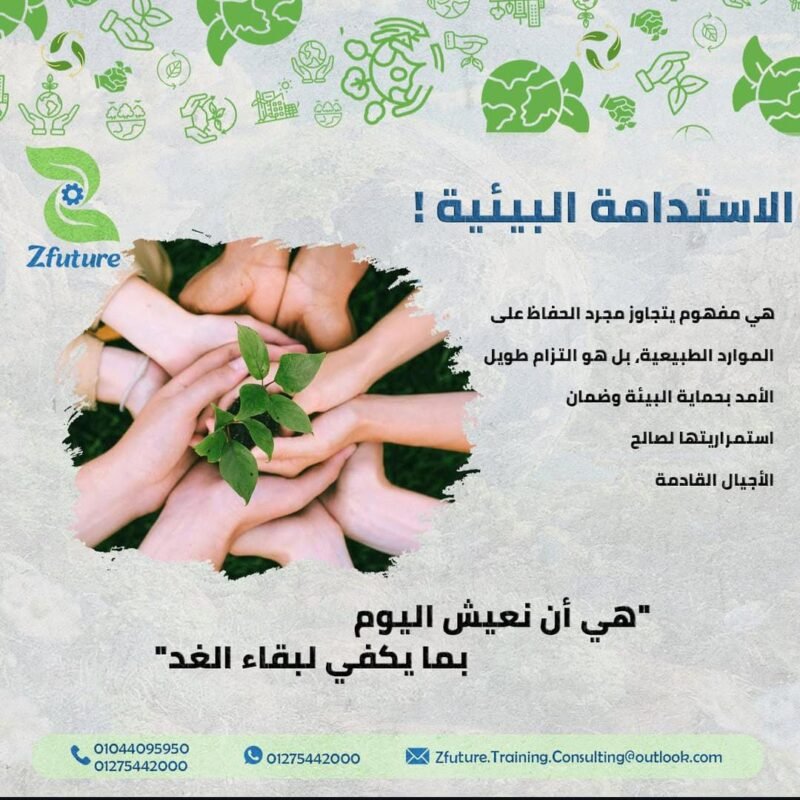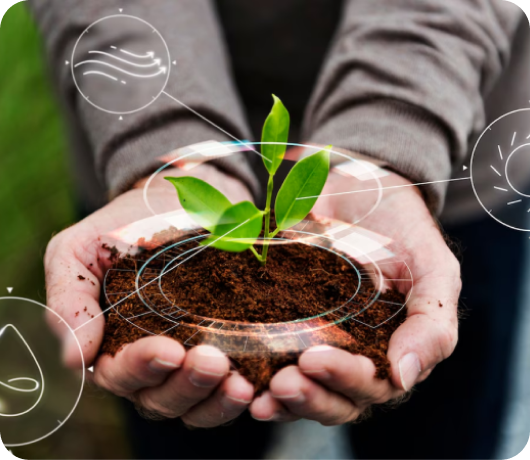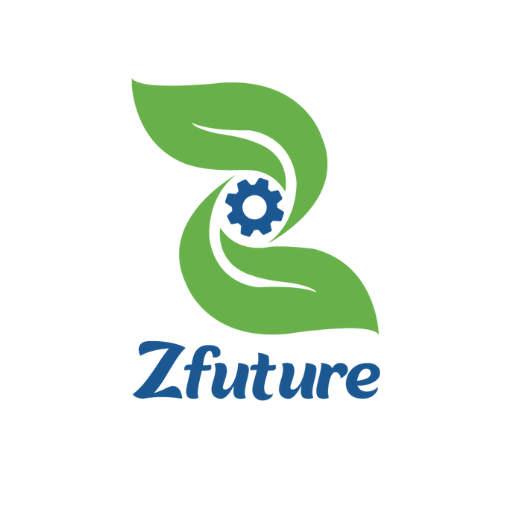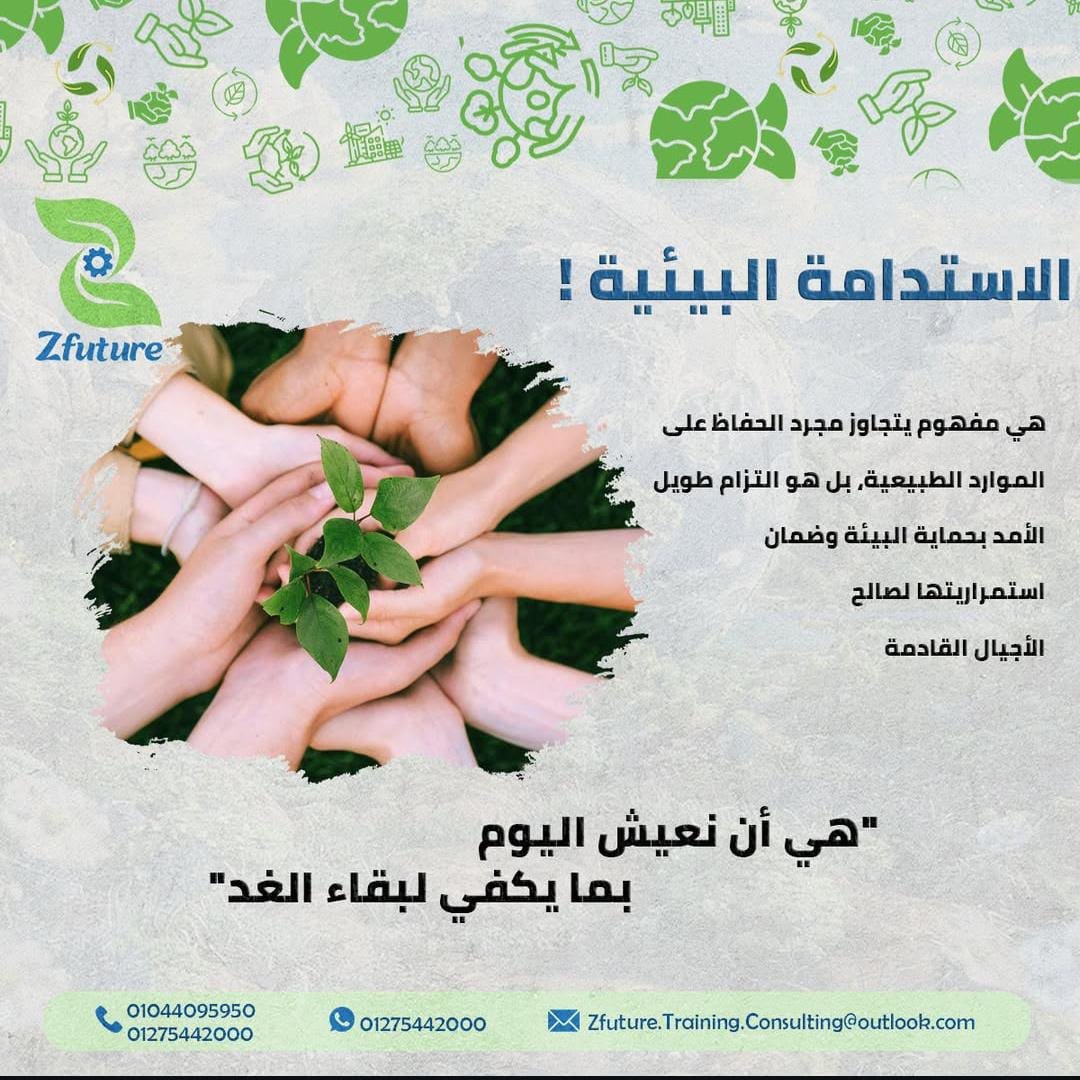The Sustainable Development Course from Zfuture Consulting and Training Company. Learn the details of the Sustainable Development Course in Egypt and the Arab world, and the concept and goals of sustainable development. Sustainable development is more than just a concept; it is a smart business strategy. By integrating socially, environmentally, and economically responsible practices, organizations not only achieve higher profits (up to 30%) and a 10% increase in market value, but also enhance their reputation, increase employee and customer loyalty, and improve internal performance. This sustainability is not just an option; it is a necessity to ensure the organization’s survival and competitiveness in the future. You will learn all the details through the Sustainable Development Course.
Recent global crises, such as the COVID-19 pandemic and recurring natural disasters, have clearly shown that the traditional development model based on exploitation is unsustainable. Sustainable development offers us a comprehensive alternative, where environmental, social, and economic considerations are integrated into the core of business. By adopting sustainable practices, organizations can contribute to building a more sustainable and resilient future while achieving financial profits at the same time. The Sustainable Development Course is one of the best training courses we offer.
Contact us now for free to get all the details about the training courses available from Zfuture Consulting and Training Company.
What you will learn in the Sustainable Development Course:
- Distinguish between terms like charity work, corporate social responsibility, and sustainable development, and understand their history and evolution.
- Gain a deep understanding of the pillars of sustainable development in the Environmental Sustainability Course.
- Learn the benefits and true value of adopting a sustainable development strategy.
- Understand the essential steps needed to establish a sustainable development strategy.
- The ability to outline a preliminary strategy plan and its key pillars.
You can contact us through the WhatsApp button to get more precise details for free about the Sustainable Development Course.

Sustainable Development Course:
If you’re looking for an opportunity to develop your skills and contribute to building a more sustainable future, the Environmental Sustainability Course from Zfuture Consulting and Training Company is the perfect solution for you. This comprehensive and innovative course is designed to provide you with the knowledge and tools needed to understand and apply sustainability principles for companies and factories.
Importance of the Sustainable Development Course:
- Understanding the Dimensions of Sustainability: In this course, you will learn about the economic, social, and environmental aspects of sustainable development and how they interconnect.
- Developing Practical Skills: You will acquire the skills needed to assess the environmental performance of organizations, develop sustainable strategies, and manage green projects.
- Commitment to Sustainable Development Goals (SDGs): You will become familiar with the United Nations Sustainable Development Goals (SDGs) and how you can contribute to achieving them.
- Staying Ahead of Change: You will be updated on the latest trends and practices in the field of sustainability.
Course Content for Sustainable Development:
- Introduction to the Concept of Sustainability:
History of sustainability, its importance, and global objectives. - The Three Pillars of Sustainability:
Economic, social, and environmental aspects of sustainability. - Assessing Environmental Performance:
Tools and methods for evaluating the environmental impact of organizations. - Developing Sustainability Strategies:
Creating action plans to achieve sustainability goals. - Managing Green Projects:
Managing projects that aim to achieve sustainability. - Innovation and Leadership in Sustainability:
Discovering the latest sustainable technologies and solutions. - Sustainable Financing:
Funding sources and financial mechanisms to support sustainable projects.
This course will empower you to be part of the global movement for sustainability and enable you to apply sustainable practices in your organization or future projects.

Topics of the Sustainable Development Course
The complexities of sustainability in the field of building and developing built assets, along with the challenges, importance, and impacts of related roles.
In the Sustainable Development or Environmental Sustainability course, you will learn all the details in the field of building and developing built assets, the important roles of innovations, professional performance in work, as well as ethics, culture, and procurement practices and regulations.
- Economic Sustainability and Effective Business Case Roles: Organizational size, network dynamics, integrated delivery, and procurement practices.
- Social Sustainability in Building and Asset Development: The roles of construction processes, outputs, and the results that benefit people and communities.
- Lessons Learned from Best Sustainability Practices: How these can be adopted and considered, alongside the challenges and appropriate guidelines for implementation.
Who will benefit from the Sustainable Development Course?
- Professionals from various fields: managers, engineers, environmental scientists, and more.
- Entrepreneurs: those looking to create sustainable projects.
- Government and private institutions: seeking to adopt sustainable practices.
- Students and researchers: interested in studying sustainability issues.
Training Methodology in the Sustainable Development Course:
- Theoretical Lectures: Covering fundamental concepts and theories related to sustainability.
- Practical Exercises: Applying theoretical knowledge through problem-solving and case studies.
- Field Visits: To observe best practices in the sustainability field.
By the end of the Sustainable Development Course, the learner will be qualified to:
- Understand the complexities of sustainability from both a general perspective and specific project perspectives, alongside stakeholder commitments.
- Learn to evaluate the environmental considerations of sustainability and their impact on construction processes and practices.
- Assess the economic considerations of sustainability and their impact on construction practices.
- Evaluate the social considerations of sustainability and their effects on construction processes.
- Gain a deeper understanding of lessons learned from good sustainability practices and how to implement them across various projects.
- Learn about the nature of achieving sustainability within the urban environment of the future, considering the most likely future scenario for the sustainable development agenda.
You will also be able to create a ready-to-submit research paper on Sustainable Development in PDF format.
You can also explore other training courses we offer, such as the Carbon Footprint Diploma, and more.
Definition of Sustainable Development
The concept of sustainable development has undergone a drastic transformation over time, from individual charitable actions by companies to a comprehensive business management strategy. This journey began with charity driven by religious and ideological beliefs and evolved into a deeper understanding of the impact of business on society and the environment. As awareness grew regarding the negative effects of pollution and global warming, it became clear that traditional economic growth alone was insufficient.
The Earth’s temperature rise by two degrees Celsius due to industrial carbon emissions led to an increase in natural disasters such as floods, droughts, and fires, which negatively affected the global economy and local communities. On the social front, unethical labor practices, such as child labor and forced labor, have led to exacerbated social gaps and instability. Amid these challenges, sustainability has become a pressing necessity, with companies striving to balance profits with social and environmental responsibility to ensure their long-term survival and prosperity.

The Core Benefits of Sustainable Development for Institutions
Studies have shown that organizations that integrate sustainability into their daily operations outperform other organizations in terms of financial performance, productivity, investment attraction, and more.
Benefits of Sustainable Development:
- Environmental Protection: Promotes practices that reduce environmental harm, such as minimizing waste, reducing carbon emissions, and conserving natural resources.
- Improved Quality of Life: Enhances social and community well-being by addressing inequality, improving health, and ensuring access to basic needs.
- Sustainable Economic Growth: Supports long-term economic stability by promoting green technologies, renewable energy, and sustainable business practices.
- Social Justice: Ensures equal access to opportunities for all people, focusing on the inclusion of marginalized and vulnerable communities.
In 2015, all UN member states adopted the Sustainable Development Goals (SDGs), also known as the Global Goals, as a universal call to action to end poverty, protect the planet, and ensure peace and prosperity for all by 2030.
The 17 SDGs are interconnected, recognizing that action in one area will affect outcomes in others, and that development must balance social, economic, and environmental sustainability.
By committing to leave no one behind, countries pledged to accelerate progress for those who are furthest behind. This is why the SDGs are designed to transform the world across various aspects, including extreme poverty, hunger, HIV/AIDS, and gender discrimination.
Everyone needs to contribute to achieving these ambitious goals. Innovation, knowledge, technology, and financial resources from all sectors of society are essential for achieving the SDGs in every context.
Green Economy and Sustainable Development
A green economy is a sustainable development model that aims to balance economic growth with environmental protection and improved people’s well-being. This is achieved through investments in eco-friendly technologies, pollution reduction, and resource efficiency, ensuring the welfare of current and future generations. The green economy seeks to build a thriving and environmentally and socially sustainable economy by reducing carbon emissions, improving resource efficiency, protecting biodiversity, and promoting social justice, all of which contribute to human welfare and community development.
According to the United Nations Environment Programme, the green economy is an economy that seeks to improve human welfare and social justice while significantly reducing environmental risks, through investment in sectors that help protect the environment and improve resource efficiency.
Green Economy in the Context of Sustainable Development
The Rio+20 document emphasized the importance of the green economy as a tool to achieve sustainable development and eradicate poverty. It called for supporting countries in adopting this economic model by providing the necessary tools, expertise, and investments in environmental protection, enhancing sustainable livelihoods for the poor, and directing investments toward building natural capital, ecosystem services, and supporting policies that contribute to income patterns and well-being for the poor. These reforms will also result in overall economic growth and encourage more trade in sustainably produced goods.
Dimensions of Sustainable Development
The 2030 Agenda is based on the principle of interconnectedness among the three essential dimensions of sustainable development: economic, social, and environmental. However, many countries and regional forums still face challenges in adopting an integrated approach across all dimensions of sustainable development. The COVID-19 pandemic has exacerbated these challenges. In Africa, many UN country teams lack the political and technical expertise to integrate environmental dimensions into national programming responses. This situation is worsened by weak national environmental authorities, insufficient integration into national institutional frameworks, and a lack of awareness among key actors, such as policymakers.
The UN Environment Programme (UNEP), as the global body that sets the environmental agenda and promotes the consistent integration of environmental sustainability within the UN system, is uniquely positioned to tackle these issues at global, regional, and local levels.
The Importance of Sustainable Development
Sustainable development is essential for building a better future for generations to come, as it strives to balance economic growth, environmental protection, and social well-being. By adopting sustainable practices, we can ensure that we meet our current needs without compromising the ability of future generations to meet theirs, thus guaranteeing the sustainability of our planet and resources. With the increasing global challenges like climate change and resource depletion, sustainable development has become an urgent necessity.
It provides a comprehensive framework for addressing these challenges and achieving the SDGs, including eliminating poverty, improving health, promoting education, and combating inequalities.
Sustainable development is an investment in the future, contributing to improving the quality of life, creating jobs, promoting economic growth, and protecting the environment. By embracing sustainable practices, we can build healthier, happier, and more resilient communities in the face of future challenges.

Business Sustainability through Sustainable Development
Business sustainability goes beyond being a mere trend; it is an urgent necessity in our modern world. As awareness about the importance of protecting the environment and natural resources grows, it has become imperative for businesses to adopt sustainable practices to ensure their survival and growth in the long term.
What is Business Sustainability?
Business sustainability is the integration of environmental and social considerations into all aspects of a business, from production and marketing to human resource management. Sustainable companies strive to achieve a balance between profitability, social responsibility, and environmental stewardship.
Importance of Business Sustainability:
- Improved Image and Reputation: Sustainable businesses become more attractive to consumers and investors, which enhances customer loyalty and attracts new investments.
- Risk Reduction: Sustainable businesses mitigate environmental and social risks that could affect their operations in the long term.
- Innovation and Growth: Sustainability encourages innovation and the development of new products and services that meet the changing market demands.
- Social Responsibility: Sustainable businesses contribute to improving the communities they operate in by providing job opportunities and supporting social initiatives.
- Compliance with Laws and Regulations: Many governments require businesses to disclose their environmental and social practices, and sustainability helps businesses comply with these regulations.
How Can Companies Achieve Sustainability?
There are many ways companies can achieve sustainability, including:
Reducing Environmental Impact:
- Using renewable energy: Transitioning to clean energy sources such as solar and wind power.
- Reducing waste and recycling: Minimizing waste generation and promoting recycling programs.
- Using sustainable raw materials: Sourcing eco-friendly materials to reduce the environmental footprint.
- Limiting carbon emissions: Implementing practices to reduce greenhouse gas emissions from operations.
Social Responsibility:
- Supporting local communities: Engaging in projects that support and benefit local communities.
- Respecting workers’ rights: Ensuring fair labor practices and a safe working environment.
- Diversity and inclusivity: Promoting diversity in the workplace and inclusive practices.
- Participating in charitable initiatives: Contributing to social causes and community welfare.
Good Governance:
- Transparency and accountability: Ensuring that business operations are transparent and accountable to stakeholders.
- Fighting corruption: Taking a strong stance against corruption and unethical practices.
- Risk management: Developing strategies to anticipate and manage potential business risks.
Sustainable Innovation:
- Developing eco-friendly products and services: Creating offerings that have a minimal environmental impact.
- Improving operational processes: Streamlining operations to reduce resource consumption and waste.
- Adopting new technologies: Embracing emerging technologies that promote sustainability, such as automation, AI, and clean tech.
Sustainability Investment is an Investment in the Future
Companies that embrace sustainable practices are the ones that will thrive in the long term. They will be more attractive to consumers and investors and will be better equipped to adapt to environmental and social changes.
By integrating sustainability into business strategies, companies not only ensure their own long-term success but also contribute to creating a more sustainable and resilient world for future generations.

Frequently Asked Questions (FAQ)
What is sustainable development?
Sustainable development is an economic, social, and global concept defined by the United Nations, which sets a roadmap for environmental, social, and economic development worldwide. Its primary goal is to improve the living conditions of every individual in society, enhance production methods, and manage resources in ways that do not deplete the Earth’s natural resources, ensuring that future generations can enjoy these resources. It involves meeting the needs of the current generation without compromising the ability of future generations to meet their own needs, and without over-exploiting the remaining natural resources on the planet.
Who studies sustainable development?
- Students
- Professionals working in related fields
- Researchers and academics
- Policymakers and decision-makers
- Civil society
What are the elements of Goal 14 of the Sustainable Development Goals?
Goal 14 focuses on the conservation and sustainable use of oceans, seas, and marine resources. Healthy oceans and seas are essential for human survival and life on Earth.
What is Egypt’s Vision 2030 regarding sustainable development?
Egypt’s Vision 2030 focuses on improving the quality of life for Egyptian citizens and enhancing their standard of living across various sectors. It emphasizes the principles of justice, social integration, and the participation of all citizens in political and social life. Vision 2030 also prioritizes addressing the impacts of climate change through a comprehensive, sustainable ecosystem that strengthens resilience and mitigates natural risks.
What is sustainable development?
In short, sustainable development is about improving the quality of life today without compromising the rights of future generations to a better life. The concept of sustainable development is based on three main pillars: economic, social, and environmental dimensions.


Let 토닥이
care for you, the way you care for others.
برجاء التواصل معنا علي +201080833841